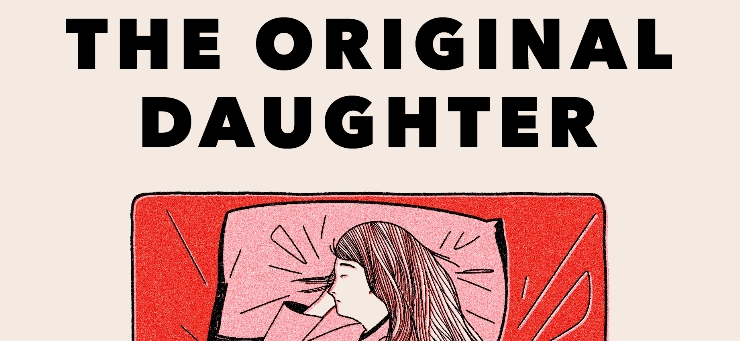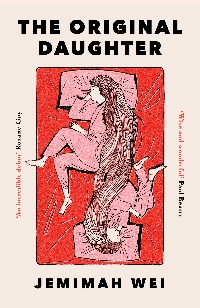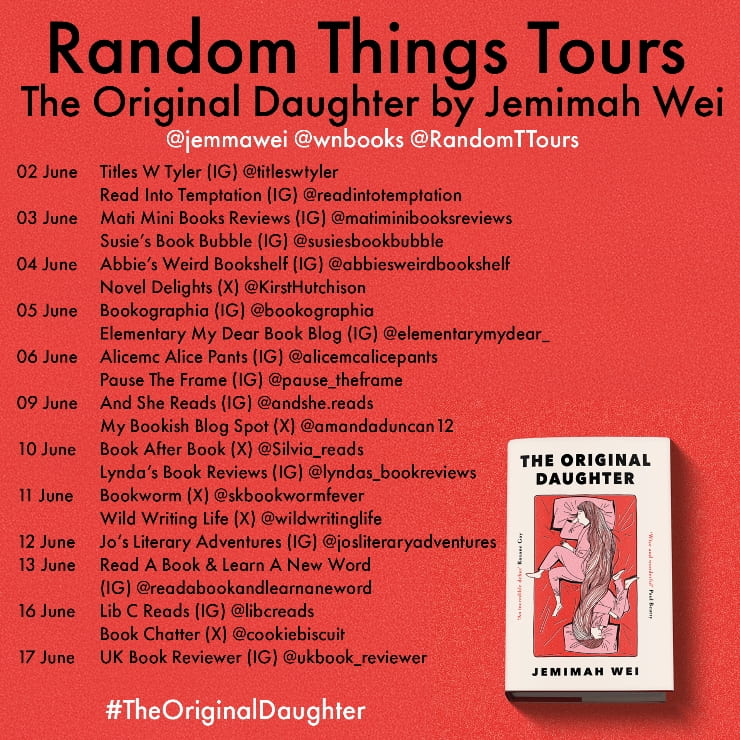Blog tour: The Original Daughter by Jemimah Wei

This post is part of a blog tour organised by Random Things Blog Tours. I received a free copy of the book in return for an honest review.
‘Singapore, 1996: Before Arin, Genevieve Yang was an only child. Living with her parents and grandmother in a single-room flat in Bedok, Genevieve is saddled with an unexpected sibling when Arin appears, the shameful legacy of a grandfather long believed to be dead.
‘Gen and Arin grow up as sisters in Singapore: a place where insistence on achievement demands constant sacrifice in the realms of imagination and play. As the sisters struggle toward individual redemption, their story reveals the fault lines of Singaporean society, our desperate need for acceptance, and our yearning to be loved.’

In The Original Daughter, by Jemimah Wei, we follow Singaporean Genevieve Yang from the age of eight – when her family is suddenly forced to adopt her seven-year-old cousin, Arin – to her mid-twenties.
Arin’s very existence is a shock to Gen’s household. They’ve only recently found out that the girls’ shared grandfather – who went away to work when Gen’s father was small, and never returned – went on to have a second family in Malaysia. The old man’s death prompts his hard-up second son to establish contact with Gen’s family and compel them to take in his youngest child.
While Gen’s spiky, bitter grandmother is largely hostile to the new arrival, Gen is excited to have a resident playmate and confidante, and her parents recognise their duty to do their best by a blameless child who is unwanted by her birth family. Before long, Arin is absorbed into Gen’s home as a well-loved daughter and sibling.
However, as the years go by, the pair’s relationship becomes complicated as Arin enjoys success at school and work while Gen flounders; they have to reckon with the manner of Arin’s arrival and the emotional impact of the pushy, controlling mother they share; and careless, hurtful things are said and done on both sides.
Things get so bad that Gen and Arin stop speaking for years. But then, their mother receives a terminal cancer diagnosis. Can Gen swallow her pride and contact her sister before it’s too late?
I found The Original Daughter an enthralling read that sparked off a lot of thoughts and emotions.
Right from the start, I felt totally drawn in to the story, which, while told from the point of view of Gen (many of my favourite scenes involved her logic and ideas as a child), encompasses the influences, dreams, and disappointments of so many other characters’ lives, giving the novel the texture of a rich tapestry.
Another reason I got really into this book was that I related to Gen quite a lot. Gen being eight and Arin being seven in 1996 puts me somewhere between them age-wise, but as Gen is the narrator and anything she says about Arin is obviously filtered through her lens, I naturally felt closer to her.
While I got the impression that Singaporean society as a whole values academic effort and success far more highly than the UK does, I shared Gen’s experiences of feeling like one of the least talented or privileged pupils at a top-performing school, and not hitting the ground running after getting a degree. I remember having almost the exact same thought as her at 17 about the never-endingness of the obligation to achieve, and could identify with her growing discomfort with others’ condescending attitudes towards manual/service workers.
Even so, after finishing the book, I was – and still am – debating with myself whether my sympathies lay more with Gen, Arin, or their mother, Su. While Gen was particularly relateable for me and had good reasons to feel hurt and hard done-by, sometimes her self-sabotage and stubbornness made me want to shake her. She might also have tried harder to understand that, no matter how kind her new family were, Arin would nonetheless bear the mental scars of being unwanted and displaced by her birth family.
This unquestionable trauma made me feel kindly towards Arin. Even when she completely messed up and really hurt Gen, I found myself ultimately giving her the benefit of the doubt. This was partly because she was still very young at that time, and would have matured a lot subsequently. Also, though, Arin may well have felt even more pressured than Gen did to make a success of her life, because she didn’t want to disappoint the woman who’d made sacrifices to raise her as her own, and maybe feared being cast out all over again.
Su was absolutely overbearing and interfering, and pushed her own thwarted ambitions onto her daughters. However, it can be argued that she did the best she knew how, and you can both love your children and give them your all, and feel discontented because your life didn’t turn out how you’d imagined or hoped. This book really gets across how humans can be complex, contradictory, and more than one thing.
With my “lapsed historian” hat on, The Original Daughter bears out the argument I make in my thesis that being an only child doesn’t necessarily mean you’re lonely, and having siblings doesn’t always protect you from loneliness.
Before Arin arrives, Gen is an only child, yet she explicitly says she’s not lonely. Her parents are attentive (though her sour grandmother gives the flat a bit of an atmosphere); she has schoolfriends; and she lives in a sociable area of public housing where most people know each other and it’s evidently safe for children to roam and play outdoors.
Arin, on the other hand, had a number of older siblings in her birth family, yet she never refers to them, suggesting they weren’t anywhere near as close as she and Gen become. Considering Arin’s father had been hoping to farm her out for quite some time, and her mother didn’t even look up from her chores when Arin left their home for the last time, it’s possible her siblings had shielded themselves from getting too attached to her, or imbibed their parents’ view of her as an unwanted burden. Alternatively, they might just have faced insurmountable differences in age, gender, or interests.
Here be mild spoilers and non-graphic references to sexual assault.
For a short period in her early twenties, Gen briefly manages to break away from her family, moving to New Zealand, where one day she's sexually assaulted by a stranger in a deserted public place, and understandably develops PTSD as a result.
During the period when, still reeling from the attack, she's behaving erratically, she loses her virginity to Micah, a young American man she's become sort-of friends with. While Gen doesn't perceive it as such (this was a less enlightened, pre-#MeToo time), this is totally a second violation: Gen's vulnerable and Micah knows it; she doesn't say yes or show any enthusiasm; and she gives in out of resignation, exhaustion, and/or misplaced guilt for being mean to him when he's been nothing but kind to her.
We obviously can't know whether this exacerbates Gen's existing PTSD symptoms (she convinces herself she must have given some small sign of consent, but her subconscious/body may know otherwise), or she's set to be retraumatised further down the line when she reassesses the experience in light of new knowledge. I really hope she doesn't have more PTSD in her future, though, as by the end of the book she's been through enough and is tentatively positive about her future.
The Original Daughter is a captivating, arresting novel that will stay with me for a while.
